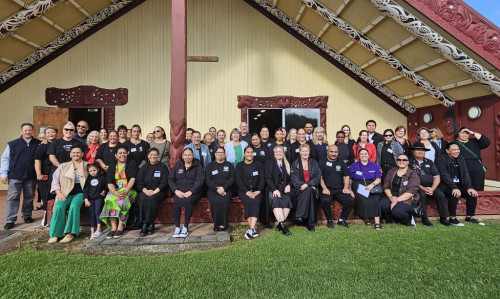

Ask nurse Pirihira Puata (Te Aupouri, Ngai Takoto, Ngāpuhi, Tapuika, Ngati Maniapoto) about her biggest takeout from the recent vaccinators wānanga in Tāmaki Makaurau, and her answer is simple.
“The opportunity for our Māori workforce to gather, tautoko, talk about our mahi and how we can support tamariki and whānau, sharing with one another the different ways we’re delivering immunisation services and learning from experienced vaccinators, within a safe kaupapa, was special,” says Pirihira.
“Encouraging our fellow Māori nurses to be protractive about the future and the way they can help our people, is empowering, especially in the vaccination space where building trust and connection is so important for our whānau.”
Pirihira, who works as Manakidz Team Lead with Te Hononga o Tamaki me Hoturoa and Clinical lead for the Māori Mobile Unit with Te Puna Manawa, was among around 20 nurses from hauora Māori partners across Tāmaki Makaurau who took part in the two-day wānanga to become qualified immunisation vaccinators.
She is passionate about Māori health and taking a kaupapa Māori approach to working with whānau and knows how important it is to connect.
“Building trust and rapport with whānau is a big part of our job. Without trust, we won’t get anywhere. That’s what I love about being able to manaaki and tautoko our families and providing a service in a way that works for them,” explains Pirihira.
“While protecting our tamariki against infectious diseases like measles is important I know there are whānau who are nervous about getting immunised because they’ve heard different kōrero. I support whānau so they can make an informed choice. We are not there to tell them what to do, we are there to provide the information to help them decide.”
The wānanga was the perfect prelude to World Immunisation Week (24-30 April).
Hauora Māori partners have organised clinics and events across the motu to coincide with the week raising awareness about immunisations. These include a Raukawa Whānau Ora mobile drive visiting kaumātua flats, an immunisation clinic at the Waitaha Regional Haka competition provided by Te Puawaitanga ki Ōtautahi Trust and a clinic at Tahuna Marae Whare Oranga in Waiuku, Port Waikato.
Pirihira encourages whānau to seek support if they want to immunise their pēpi and tamariki.
“Reach out to your local provider, community service, marae, or a health professional you trust for a kōrero and ask questions, because there is no such thing as a dumb question. Don’t be whakamā to ask for help, there is always someone that can help.”
